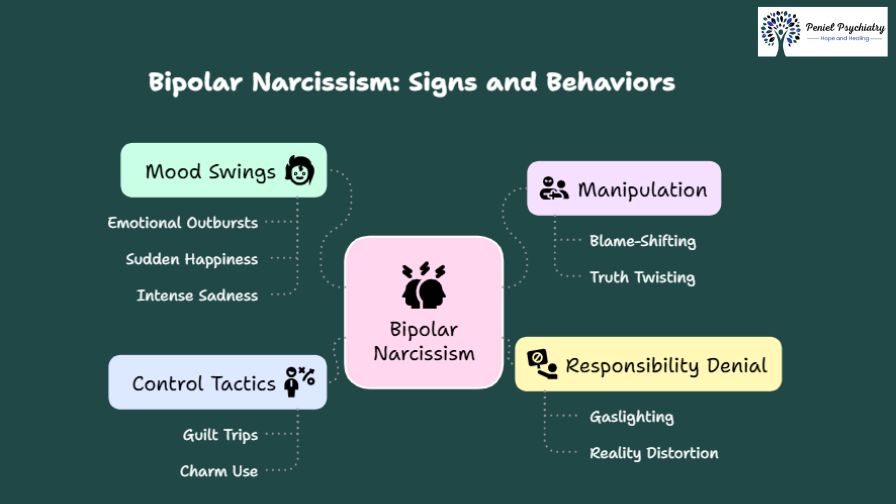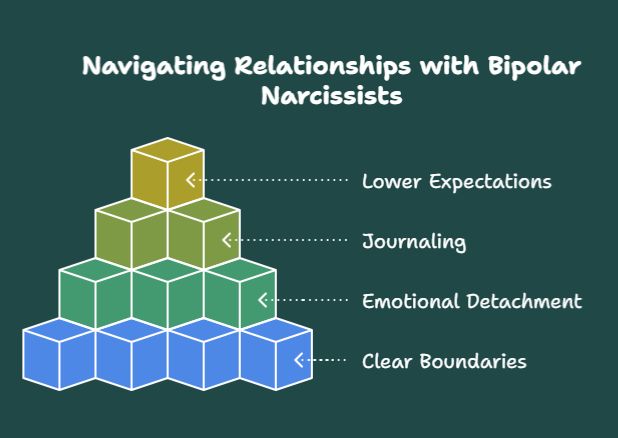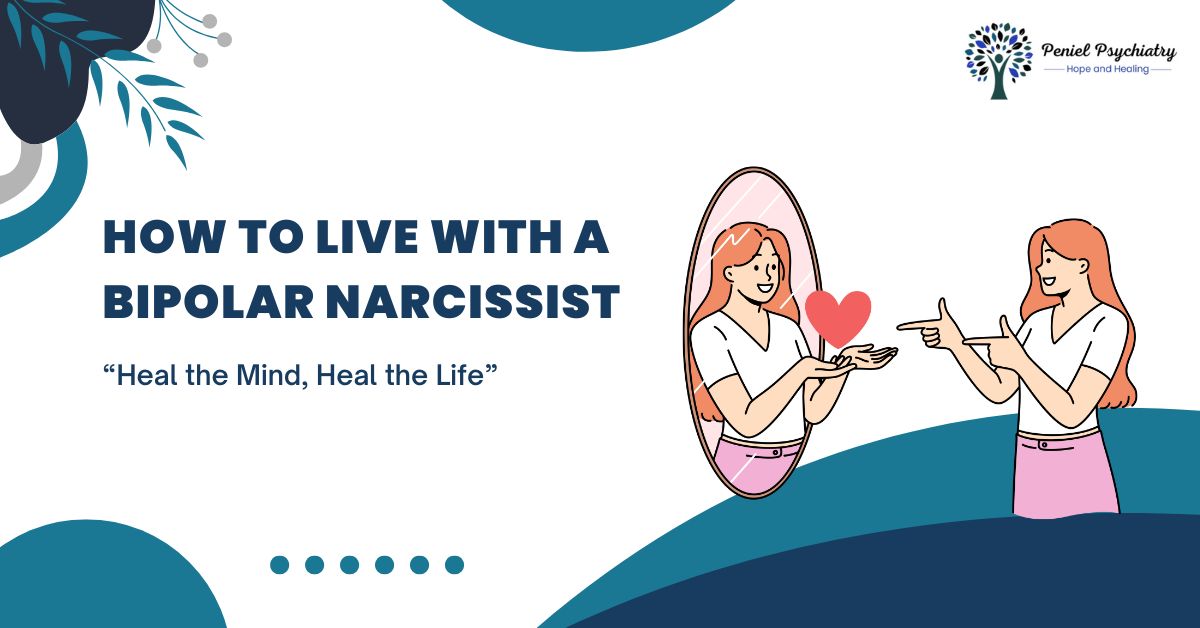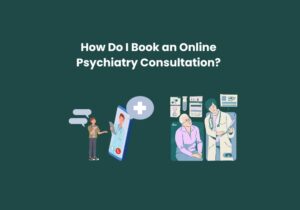Living with a bipolar narcissist is hard. It drains your energy, messes with your mind, and makes you doubt what’s real. When someone has both bipolar disorder and narcissistic traits, things can get out of control fast. One moment, they may act warm and caring.
Next, they may lash out, blame you, or twist the truth. You may feel confused, tired, and always on edge. Many people in this kind of relationship deal with gaslighting, mood swings, and emotional stress. In this guide, you’ll learn how to spot the signs and protect your mental health without losing yourself.
Understand What Bipolar and Narcissistic Mean
Many people confuse bipolar disorder and narcissistic personality disorder. They are different but can appear together. Knowing how each works helps you understand why living with a bipolar narcissist can be so hard.
What Is Bipolar Disorder?
Bipolar disorder is a mood disorder. It causes significant changes in how a person feels and acts. Sometimes, they feel pleased, full of energy, or even restless.
This is called mania or hypomania. Other times, they feel very sad, tired, or hopeless. These are depressive episodes. These mood swings can occur suddenly or persist for weeks. The changes affect their thoughts, behavior, and relationships.
What Is Narcissistic Personality Disorder?
Narcissistic personality disorder (NPD) is a long-term condition. People with NPD often believe they are better than others. They want a lot of praise and may lack empathy. They can act selfishly and blame others for their problems. They might also twist facts or use charm to achieve their goals.
How Can Someone Have Both?
It’s possible to have bipolar disorder and narcissistic traits at the same time. When this happens, the person’s mood swings mix with self-centered and controlling behavior. This can make their actions more unpredictable and extreme.
Why Does This Mix Cause Emotional Chaos?
When someone has both, they may switch quickly from being loving to cruel. Their moods and need for control can cause fights, confusion, and hurt feelings. You might feel on edge, never sure how they will act next. This emotional rollercoaster makes relationships very hard to manage.
Spot the Signs of a Bipolar Narcissist
Living with a bipolar narcissist can feel confusing. To handle it, you first need to recognize the signs. Knowing what to watch for helps you stay aware and protect yourself.

Sudden Mood Swings and Emotional Outbursts
People with bipolar disorder experience fast and substantial mood changes. One moment, they might be happy and energetic. Next, they may become angry or very sad. When combined with narcissism, these mood swings often come with intense emotional outbursts.
Manipulation and Blame-Shifting
A bipolar narcissist often uses manipulation to get what they want. They rarely take responsibility for their actions. Instead, they blame others or twist the truth. This blame-shifting can make you feel guilty or confused.
Switching Between Affection and Hostility
They might act loving and charming one day, then distant or hostile the next. This mix of extreme behaviors can leave you unsure about how to respond.
Denying Responsibility and Twisting Reality
They may deny what they said or did, even if you remember clearly. This gaslighting makes it hard to trust your memory or feelings.
Using Guilt or Charm to Control
To keep control, they might use guilt trips or sweet talk. This pushes you to forgive or overlook bad behavior, keeping you stuck in the cycle.
Notice How Their Behavior Affects You
Living with a bipolar narcissist can take a heavy toll on your emotions and mind. It’s essential to understand how their actions impact you, so you can take the necessary steps to protect yourself.
Feeling Drained and Confused
Their constant mood swings and manipulation can wear you out. You might feel tired all the time or confused about what’s happening.
Doubting Yourself
They may twist facts or deny things you clearly remember. This gaslighting makes you question your memory and judgment. It can leave you feeling unsure and lost.
Want to understand the link between anxiety attacks and memory loss? Please read our complete guide here: Anxiety Attack Memory Loss.
Walking on Eggshells
You may have to be careful with every word and action. This “walking on eggshells” happens because you fear their sudden anger or mood changes.
Experiencing Anxiety, Depression, or Burnout
Being in this kind of relationship can increase your stress. You might notice feelings of anxiety or sadness growing over time. Sometimes, it can lead to emotional burnout.
Learn more about Understanding the symptoms of bipolar depression helps you recognize mood changes early.
Losing Your Sense of Self
Over time, their controlling behavior may make you forget what you want or who you are. This loss of identity is common in toxic relationships with bipolar narcissists.
Avoid Common Mistakes People Make
When you live with a bipolar narcissist, it’s easy to make choices that hurt you more. Knowing what to avoid helps you protect your peace of mind.
Don’t Try to Fix or Save Them
You can’t change a bipolar narcissist. Trying to “fix” them only causes frustration and drains your energy. Their condition and behavior need professional help.
Don’t Blame Yourself for Their Actions
They often blame others, but you are not responsible for their moods or hurtful behavior. Stop taking their actions personally.
Avoid Reacting Emotionally to Manipulation
It’s natural to feel upset when they blame or insult you. But reacting with anger or tears gives them power. Staying calm helps you keep control.
Don’t Isolate Yourself
Sometimes, it’s best to pull away from friends or family. But isolation can make things worse. Keep your support system close. Talking to others helps you stay strong.
Set Boundaries to Protect Your Peace
Living with a bipolar narcissist means you need firm boundaries. These help you keep control of your emotions and protect your mental health.

Create Clear, Firm Boundaries
Decide what behavior you will and won’t accept. Be clear about your limits. For example, you might say no to yelling or blaming. Stick to these rules, even if they get upset.
Practice Emotional Detachment
Try not to take their mood swings or blame them personally. Emotional detachment means you don’t let their actions pull you into their chaos. This helps you stay calm and balanced.
Write Things Down
Keep a journal of what happens. Writing helps you track patterns and protects you from gaslighting. It also reminds you of the truth when you feel confused.
Lower Your Expectations
Accept that they may not change or take responsibility for their actions. This helps reduce disappointment and emotional pain.
Ask Yourself If You Should Stay or Leave
Deciding whether to stay in a relationship with a bipolar narcissist is hard. It takes honest thinking about your feelings, safety, and future. Before making this choice, you need to ask yourself some critical questions.
Check If They Take Treatment and Responsibility
People who get help for bipolar disorder and try to own their actions often show real change. If your partner refuses treatment or blames you, it’s a warning sign.
Measure the Emotional Damage
Think about how much this relationship affects your mental health. Do you often feel drained, anxious, or hopeless? These feelings matter and shouldn’t be ignored.
Ask: “Do I Feel Safe?”
Your safety comes first. Emotional or physical harm is a clear sign to get help or leave. Never stay in a situation that hurts you.
Reflect on What You Need
Be honest about what you want from life and love. If this relationship stops you from being happy, it might be time to move on.
Use Coping Skills If You Decide to Stay
Staying with a bipolar narcissist is tough. If you choose to stay, you need tools to protect your mental health and keep the peace. Using coping skills helps you manage stress and avoid being pulled into chaos.
Build a Strong Support System
Don’t face this alone. Friends, family, or support groups can offer a listening ear and help you stay grounded. Talking to people who understand your struggles reduces isolation and emotional burnout.
Prioritize Self-Care
Taking care of yourself is not selfish; it’s necessary. Make time for therapy, exercise, and rest. These actions improve your mood and help you handle emotional stress.
Learn to Respond, Not React
When your partner acts out, try to stay calm. Reacting with anger or sadness can fuel their need to control or blame. Responding calmly helps you keep control and avoid power struggles.
Avoid Power Struggles
A bipolar narcissist may try to control or provoke you. Don’t engage in fights over who is right or wrong. Instead, focus on your well-being and maintain firm boundaries.
Practice Emotional Detachment
Try to separate your feelings from their moods. Emotional detachment doesn’t mean you stop caring. It means you protect your heart from the pain of their unpredictable behavior.
Get Help from Mental Health Professionals
Living with a bipolar narcissist can be overwhelming. Getting professional help is a crucial step to protecting your mental health and finding support.
Start Therapy for Yourself
Therapy can provide a safe space for you to discuss and understand your feelings. A therapist helps you build coping skills and heal from emotional stress caused by the relationship.
Join Support Groups
Support groups for people dealing with narcissistic abuse or bipolar partners offer understanding and shared experiences. Connecting with others who face similar struggles can reduce loneliness and offer hope.
Consider Couples Therapy Carefully
Couples counseling may be beneficial if both you and your partner are committed to making changes. However, it often doesn’t work when one side denies problems or refuses treatment. Be realistic about what therapy can do.
If you ever feel emotionally or physically unsafe, book your appointment for emergency help.
Getting help is not a sign of weakness. It shows you value your health and want to find peace. You don’t have to go through this alone. Professionals and support groups can guide you to a better place.
Frequently Asked Questions (FAQs)
What does it mean to live with a bipolar narcissist?
Living with a bipolar narcissist means sharing your life with someone who has mood swings from bipolar disorder and selfish or controlling behavior from narcissistic personality disorder. This mix can cause unpredictable moods and emotional stress.
How can I protect my mental health when living with a bipolar narcissist?
You can protect your mental health by setting firm boundaries, practicing emotional detachment, keeping a support system, and seeking therapy or support groups. Avoid reacting emotionally to manipulation.
Is it possible for a bipolar narcissist to change?
Change is hard and usually requires professional treatment and personal accountability. Without both, it’s unlikely they will change their behavior. Focus on your well-being first.
When should I consider leaving a bipolar narcissist?
Consider leaving if their behavior causes emotional or physical harm, if they refuse treatment, or if you feel unsafe or constantly drained. Your safety and mental well-being should be your top priority.
Can therapy help couples where one partner is a bipolar narcissist?
Couples therapy may help only if both partners are willing to work on the relationship and seek treatment. If one partner denies problems or refuses help, therapy often has limited results.
Final Thoughts
Living with a bipolar narcissist is one of the most complex challenges you can face. It tests your emotions, patience, and strength every day. Remember, it is okay to feel overwhelmed. You are not weak for struggling.
This kind of relationship often causes emotional pain, confusion, and stress. But you deserve to protect your mental health and find peace. Setting boundaries and getting support are essential steps to take care of yourself.
You do not have to do this alone. Reach out to trusted friends, family, or mental health professionals. They can help you stay grounded and strong.
Most importantly, remember that your feelings matter. Your well-being is just as important as anyone else’s. Take time for self-care, keep your support system close, and listen to what your heart needs.
Living with a bipolar narcissist is tough, but with the right tools and help, you can find ways to protect yourself and create a healthier life.




